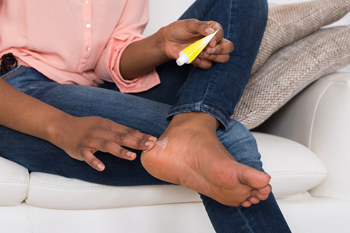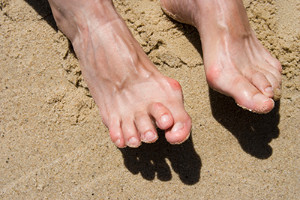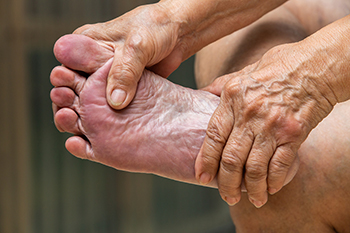
Unpleasant foot odor, cracked heels, and changes in skin or nails are common concerns that can signal underlying issues. Foot odor often results from bacteria mixing with sweat, especially in tight or non-breathable shoes. Fungal infections like athlete’s foot or toenail fungus can worsen odor and cause scaling, peeling, or thickened nails. Cracked heels, on the other hand, often develop from dry skin, prolonged standing, or wearing open-back shoes. They may start as small splits but can deepen and become painful or infected if not treated. Changes in foot appearance, such as redness, thick nails, or skin irritation, should not be ignored. Good hygiene, moisturizing regularly, and wearing proper footwear can help prevent many of these problems. However, if symptoms continue or become more severe, especially if you have diabetes or circulation issues, it is suggested that you see a podiatrist for expert evaluation and treatment.
If the skin on your feet starts to crack, you may want to see a podiatrist to find treatment. If you have any concerns, contact one of our podiatrists from Centers for Foot & Ankle Care. Our doctors can provide the care you need to keep you pain-free and on your feet.
Cracked Heels
It is important to moisturize your cracked heels in order to prevent pain, bleeding, and infection. The reason cracked heels form is because the skin on the foot is too dry to support the immense pressure placed on them. When the foot expands, the dry skin on the foot begins to split.
Ways to Help Heal Them
- Invest in a good foot cream
- Try Using Petroleum Jelly
- Ease up on Soaps
- Drink Plenty of Water
Ways to Prevent Cracked Heels
- Moisturize After Showering
- Skip a Shower
- Keep Shower Water Lukewarm
- Don’t Scrub Your Feet
If you are unsure how to proceed in treating cracked heels, seek guidance from a podiatrist. Your doctor will help you with any questions or information you may need.
If you have any questions, please feel free to contact one of our offices located in Merrillville, Portage, Michigan City/LaPorte, and Schererville, IN . We offer the newest diagnostic and treatment technologies for all your foot care needs.

As people age, changes in foot structure and walking style can lead to common toe problems. Seniors with flat feet, or pes planus, may be more likely to develop hammertoes and overlapping toes due to the way pressure is distributed when walking. In contrast, high arches, called cavus foot posture, do not appear to be linked to these specific concerns. Older adults who have a pronated foot function, meaning their feet roll inward while walking, may face a higher risk of developing bunions and overlapping toes. Those with supinated feet, which roll outward, may be less likely to develop bunions and big toe stiffness. Since foot posture often changes with age, it is important for seniors to have their foot health checked regularly. Early recognition of abnormal patterns can help reduce discomfort and prevent future complications. If you are a senior experiencing foot or toe problems, it is suggested that you see a podiatrist for a proper diagnosis and treatment.
Hammertoe
Hammertoes can be a painful condition to live with. For more information, contact one of our podiatrists from Centers for Foot & Ankle Care. Our doctors will answer any of your foot- and ankle-related questions.
Hammertoe is a foot deformity that affects the joints of the second, third, fourth, or fifth toes of your feet. It is a painful foot condition in which these toes curl and arch up, which can often lead to pain when wearing footwear.
Symptoms
- Pain in the affected toes
- Development of corns or calluses due to friction
- Inflammation
- Redness
- Contracture of the toes
Causes
Genetics – People who are genetically predisposed to hammertoe are often more susceptible
Arthritis – Because arthritis affects the joints in your toes, further deformities stemming from arthritis can occur
Trauma – Direct trauma to the toes could potentially lead to hammertoe
Ill-fitting shoes – Undue pressure on the front of the toes from ill-fitting shoes can potentially lead to the development of hammertoe
Treatment
Orthotics – Custom made inserts can be used to help relieve pressure placed on the toes and therefore relieve some of the pain associated with it
Medications – Oral medications such as anti-inflammatories or NSAIDs could be used to treat the pain and inflammation hammertoes causes. Injections of corticosteroids are also sometimes used
Surgery – In more severe cases where the hammertoes have become more rigid, foot surgery is a potential option
If you have any questions please contact one of our offices located in Merrillville, Portage, Michigan City/LaPorte, and Schererville, IN . We offer the newest diagnostic and treatment technologies for all your foot and ankle needs.

As the body ages, the fat pads on the feet undergo structural and functional changes that can affect comfort and mobility. Fat pad atrophy, a gradual thinning of the cushioning beneath the heel and forefoot, reduces shock absorption and increases sensitivity to pressure. The loss of elasticity in the skin and connective tissues further contributes to discomfort, making the feet more vulnerable to pain and injuries. Altered biomechanics, including changes in gait and posture, may develop as the body compensates for reduced cushioning. Increased pressure points can lead to calluses, soreness, and a higher risk of foot conditions. If you are elderly and have foot pain, it is suggested that you schedule an appointment with a podiatrist who can offer you effective relief methods.
If you need your feet checked, contact one of our podiatrists of Centers for Foot & Ankle Care. Our doctors will attend to all of your foot and ankle needs and provide you with quality treatment.
Geriatrics and Podiatry
When people age, some common issues that may occur are bone density loss, dry skin, poor circulation, and rough brittle nails. These issues may also affect your foot health if the necessary steps are not taken to alleviate the problems.
It is important to take care of your feet because feet that are injured or diseased can affect your overall health. Having painful feet hinders your ability to do daily activities or may decrease your willingness to do the things that you need to do.
Visiting Your Geriatrician
As we age, health problems become more likely, so it is essential to visit your doctor for check-ups to ensure that you are doing the best you can to take care of your health. It is recommended to check your feet frequently for any possible cuts, bruises, swelling, corns or any other irregularities.
Taking Care of Elderly Feet
Cracked or dry feet can be treated by applying moisturizer often. It is also important not to wear old socks because the older the sock is, the higher the possibility there will be that there is bacteria there. Wear fresh socks and make sure they fit properly.
Proper foot health means that you can have a more active lifestyle and you will not be bogged down by pain. Foot health also leads to good circulation, which is paramount for overall health.
If you have any questions, please feel free to contact one of our offices located in Merrillville, Portage, Michigan City/LaPorte, and Schererville, IN . We offer the newest diagnostic tools and technology to treat your foot and ankle needs.

